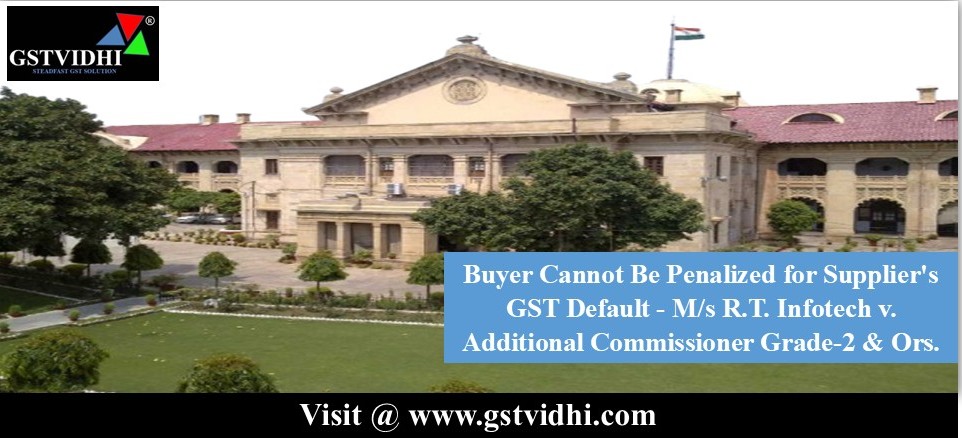
Buyer Cannot Be Penalized for Supplier's GST Default - M/s R.T.
Infotech v. Additional Commissioner Grade-2 & Ors.
WRIT TAX No. 1330
of 2022 | Order dated 30 May 2025 | High Court of Judicature at Allahabad
Summary
In a major relief to
buyers suffering due to supplier defaults, the Allahabad High Court
quashed the denial of ₹28.52 lakh Input Tax Credit (ITC) to M/s R.T.
Infotech, ruling that the purchasing dealer cannot be penalized for
the seller's failure to deposit tax, especially when the purchaser has
fulfilled all statutory obligations. The Court found that the petitioner had
valid tax invoices, paid tax through RTGS, and thus cannot be denied ITC
solely due to seller’s non-compliance under Section 16(2)(c) of the CGST
Act, 2017.
Factual
Background
1. Nature
of Business and ITC Claim: M/s R.T. Infotech is a registered
GST taxpayer in the business of mobile recharge services. It procured
mobile recharge coupons from M/s Bharti Airtel Ltd., receiving seven
invoices totaling ₹1,58,46,502, on which CGST and SGST of
₹14,26,185 each were charged.
2. Tax
Paid Through RTGS: The petitioner made payments through
banking channels (RTGS) and duly claimed Input Tax Credit (ITC) of ₹28,52,370
in its GSTR-3B.
3. Notice
of Discrepancy and Response: A scrutiny notice in Form
ASMT-10 dated 8 July 2021 was issued, citing mismatch in GSTR-2A. In Form
ASMT-11, the petitioner clarified on 20 August 2021 that the invoices were
from Bharti Airtel Ltd. and fully paid.
4. Show
Cause and Demand: Unsatisfied, the department issued a Show
Cause Notice under Section 73 (GST DRC-01), alleging wrongful ITC claim
under Section 16(2)(c). The petitioner replied, stating that the default,
if any, was on part of seller, not the buyer.
5. Assessment
and Appeal Dismissed: Despite detailed replies, the Deputy
Commissioner ordered recovery of the full ITC amount with 10% penalty and
interest on reversed ITC. The appeal was also dismissed on 24 June 2022.
Legal Issue
Whether ITC can be denied
to a bona fide purchaser who:
- Holds valid tax invoices;
- Pays tax amount through banking
channels; and
- Is not responsible for the supplier’s
failure to deposit GST with the government.
Petitioner’s
Submissions
- Complete compliance by purchaser:
Tax invoices were valid and tax was paid through RTGS.
- No control over seller:
The petitioner cannot compel the seller to:
- File GSTR-1/3B;
- Deposit collected GST.
- Misapplication of Section 16(2)(c):
Denial of ITC violates the principle of fairness and overextends the
buyer’s responsibility.
- Relied on Supreme
Court judgment: Asst.
Commissioner of State Tax v. Suncraft Energy Pvt. Ltd. (2023) 13
Centax 189 (SC), where the matter was remanded due to seller’s failure.
Respondent’s
Arguments
- ITC conditional on tax deposit:
Section 16(2)(c) requires that tax must be deposited with the
government.
- No evidence of seller compliance:
Since Bharti Airtel allegedly did not deposit tax, ITC cannot be allowed.
- Compliance gap justifies reversal:
The petitioner’s claim was not visible in GSTR-2A, hence reversal was
legal.
Key Legal
Provisions
Section 16(2)(c), CGST
Act:
The registered person
shall not be entitled to the credit… unless the tax charged in respect of such
supply has been actually paid to the Government.
Court’s
Observations and Analysis
1. Purchaser Acted
Diligently
- The petitioner had valid tax invoices
from a reputed supplier (Bharti Airtel).
- Payment was made through official
banking channels (RTGS).
- The petitioner had no control over
filing or payment obligations of the supplier.
“The purchasing dealer
cannot be left at the mercy of the selling dealer.”
2. Action Initiated
Against Supplier
- Letter from Joint Commissioner
(Lucknow) dated 5 September 2022 confirmed that action was initiated
against Bharti Airtel.
- The appellate authority ignored
this material evidence, which could have influenced the decision.
3. Judicial Precedents
Support Purchaser
Suncraft Energy
Pvt. Ltd. (Supreme Court, 2023)
Where the buyer has paid
tax and holds valid invoice, the matter should be remanded to assess seller’s
compliance.
D.Y. Beathel
Enterprises v. STO (Madras HC, 2022)
Action must be taken against
the supplier simultaneously, and not penalize only the purchaser.
“The petitioner has
discharged his duties diligently… the authority ought to have considered these
aspects.”
Court’s
Final Verdict
1. Impugned
Orders Quashed
Both the demand order and the appellate rejection were set aside.
2. Matter
Remanded for Fresh Decision
The department was directed to:
o Conduct
fresh adjudication;
o Pass
a reasoned, speaking order;
o Consider
all evidence including:
§ RTGS
payments,
§ Validity
of tax invoices,
§ Supplier’s
compliance;
o Complete
the process within two months.
3. Opportunity
to Be Given to All Stakeholders
Including the petitioner and possibly even the supplier (Bharti Airtel) if
required.
Conclusion
The Allahabad High
Court’s ruling in R.T. Infotech v. Additional Commissioner Grade 2
reinforces that denial of ITC solely on supplier’s default violates both
statutory interpretation and fairness. This case joins the growing body
of jurisprudence advocating that taxpayer rights cannot be diminished by
third-party non-compliance, particularly where full payment and
documentation are evident.
Disclaimer: All the Information is based on the notification, circular and order issued by the Govt. authority and judgement delivered by the court or the authority information is strictly for educational purposes and on the basis of our best understanding of laws & not binding on anyone.
Press On Click Here To Download File
Click here